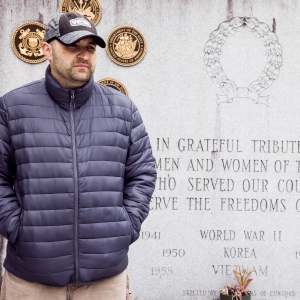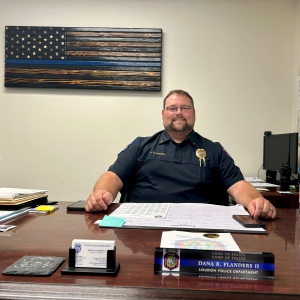Inconsistent approach on police psych exams
| Published: 09-21-2020 9:52 AM |
After police applicants in New Hampshire are winnowed by a rigorous process of written tests, interviews, oral boards, polygraph tests and background checks, many prospective officers must also be psychologically evaluated before they go through the state police academy to become certified.
Hudson Police Chief Bill Avery said psych tests are one component of the hiring process, but no less “vital” than the other screenings. And yet, the tests are used inconsistently – and sometimes not at all – by law enforcement agencies in the state.
“It’s tremendously concerning that there isn’t a uniform standard for psych evals in New Hampshire,” said Nicole Sawyer, one of a handful of psychologists in New Hampshire who performs psychological evaluations for police candidates.
Conducting an evaluation to ensure psychological stability is considered a best practice by the International Association of Chiefs of Police (IACP) and most police departments. The evaluations, which include a written test and sometimes an interview with a psychologist, are used to identify any significant pathologies, personality traits or mood disorders that would not be conducive to the stresses of police work. In some cases evaluations may even flag indicators of racism and other forms of implicit bias.
State law requires any full-time or part-time certified law enforcement officer in New Hampshire to pass a psychological screening. But the testing methods and results can vary significantly from one department to another and from one clinician to another, despite the fact that the IACP provides standard guidance for psych testing for police applicants. And until a new law which took effect this summer, not all officers in New Hampshire were tested.
It’s unknown how closely departments across the state adhered to the rules requiring psych screenings. A review published Aug. 31 by the New Hampshire Commission on Law Enforcement Accountability, Community and Transparency found that The Police Standards and Training Council (PSTC) – the state agency tasked with enforcing many of the state’s statutory police standard procedure – “omitted crucial standards” such as drug and psychological screenings. Documentation to track compliance was inconsistently completed by law enforcement agencies, and went largely unaudited by the PSTC. In addition, the law previously allowed departments to skip the evaluations if they don’t have funding for the testing.
“Consequently, some law enforcement agencies within the state may have officers who have received psychological and drug screening while others may not,” the Commission’s final report states.
The Commission found that 14.5 percent of over 100 agencies polled in New Hampshire did not consistently require psych screening for new hires and 5.3 percent said they never require psychological testing.
Article continues after...
Yesterday's Most Read Articles
 New Hampshire school phone ban could be among strictest in the country
New Hampshire school phone ban could be among strictest in the country
 ‘Would you raise your right hand?’ — Local veterans consider the meaning of Memorial Day
‘Would you raise your right hand?’ — Local veterans consider the meaning of Memorial Day
 Loudon police received a mental health call. Here’s how they avoided escalating it.
Loudon police received a mental health call. Here’s how they avoided escalating it.
 Memorial Day events in the Concord area
Memorial Day events in the Concord area
 Photos: Memorial Day parade in Concord
Photos: Memorial Day parade in Concord
 High schools: Final regular season track and tennis results; plus weekend baseball, softball and lacrosse
High schools: Final regular season track and tennis results; plus weekend baseball, softball and lacrosse
Even among those departments that do regularly conduct testing, the evaluations vary depending on who administers and assesses the tests, and what they share in their report.
In accordance with IACP guidelines, Sawyer will share in her report symptoms and personality traits she believes will interfere with police work, but she will not go so far as to label mental disorders the candidate has or mention any past traumas the candidate tells her about. Failing to include any pertinent information about the applicant in a psych report is also not recommended, according to the guidelines.
Yet, some psychologists provide law enforcement agencies only generic reports.
“I look at my job as basically saying you should hire this person or you shouldn’t,” said Manchester-based neuropsychologist William Jamieson, who works with about 10 different departments including Manchester, Concord, Derry and Portsmouth.
Some departments in the state, including Salem, have candidates complete only the written portion of the test, which is mailed away to be analyzed. These departments forgo the interview portion of the evaluation, which Sawyer says provides critical information.
Salem has used Psychological Resources Inc. out of Atlanta, Georgia to score its police candidate psych exams for at least 16 years, at a cost of $150, said Human Resources Director Anne Fogarty. Still, she plans to propose changes to the process next year.
“I’m definitely looking into other options,” Fogarty said
Psych evaluations that include an interview are more expensive. Nashua and Hudson pay Sawyer $500 per candidate; while Derry and Manchester pay Jamieson $225 per candidate, the departments said.
Avery, the Hudson chief, said you get what you pay for. Eight to 10 months ago he switched to Sawyer from another clinician, who he declined to name, after seeing a difference in how effective Sawyer is at interviewing candidates and how detailed her reports are.
“Money is no object when it comes to specifically law enforcement and making sure we have the right person to do the job,” he said, adding that evaluators could easily miss something important if a candidate isn’t interviewed effectively.
Chief Denise Roy in Merrimack echoed this. The Merrimack Police Department started sending all their candidates to Sawyer about five years ago. Prior to that, Roy said the department was inconsistent at doing psych evals.
“Before, the inconsistencies created issues with some of the people that we hired here,” Roy said.
Sawyer said many departments are surprised to learn they can get as much information as her reports provide, after switching from psychologists who regularly provide simply a pass/fail recommendation. Departments need to be educated on the IACP guidelines to know they are able to access more information from psych evaluations, she said.
In its report, the Commission included a number of recommendations for improving the psych evaluation process, including more oversight to ensure testing is happening, developing rules that set an acceptable standard for testing, and making sure every officer is undergoing required psych screening. The Commission also recommended ongoing testing for officers already on the job.
“I think we are going to see, as a result of those recommendations, some changes in the near future with respect to these issues,” Derry Police Capt. George Feole said.
Many of these proposed changes will require legislation. So far, ensuring universal psych testing for police candidates has already become law with the signing of this summer’s police reform bill. The law calls for the creation of a new fund to pay for psych screenings using the state’s drug forfeiture fund. The new fund has been established and the PSTC has so far received its first request for reimbursement, according to Director John Scippa.
Many of the people who spoke with the Granite State News Collaborative agreed that making clinician interviews a required part of the psych evaluation process should be a part of any statewide standardization efforts.
“We’re gonna be better off, we’re gonna get more qualified candidates if we all do the same thing,” Roy said.
While Sawyer and Jamieson would like to see interviews become mandatory, they did not go so far as to suggest all clinicians ought to be legally bound to use the same test.
“I think there’s always room for improvement. I think the question is how much of it is standardized and how much of it isn’t,” Jamieson said.
Beyond catching textbook pathologies or serious anxiety, clinicians conducting psych evaluations are on the lookout for personalities that may not fit well in a police uniform. Sawyer looks for indicators of rigidity, overconfidence and a black-and-white worldview; while Jamieson is wary of candidates who express an “authoritarian personality,” or who can’t easily converse with others.
For people with an existing mental health condition like Post Traumatic Stress Disorder, an interview can help to determine suitability for the job: well-controlled PTSD won’t interfere with a police career, but some people with the condition have symptoms that would likely interfere with their duties as an officer.
Implicit bias against ethnic minorities, women or LGBTQ individuals is harder to catch, Sawyer said. Racism is not listed in the latest edition of the Diagnostic and Statistical Manual of Mental Disorders (DSM-5), which psychologists use to evaluate patients. Sawyer said this is where one-on-one interviews and the type of test used can make a difference.
“There’s tremendous variability to our approach to the evaluations, right down to the assessment tests used and interview style and questions,” Sawyer said.
The names of these tests are an alphabet soup of acronyms. At least five tests are available for psych evaluations; some are generic while others are specifically designed for prospective police. Others are designed for people seeking psychiatric help, Sawyer said.
Sawyer said that no one test is necessarily better than another at finding bias, but a skilled psychologist can identify behaviors and personalities that correspond to bias-related tendencies. Two types of tests – IPI2 and the M-PULSE – have scales that measure personality indicators that may be related to bias. But when those are flagged, it’s up to the clinician how to respond and what recommendations to make.
Jamieson said when he encounters a bias flag from the test results, he conducts an interview to learn more about the candidate and what might have caused the issue to be raised in the test. Ultimately, Jamieson is not sure why the test flags someone for bias, and doubts the tests’ accuracy some of the time.
“I think that’s a hard thing to measure, I think it’s a hard thing to get a handle on,” he said.
If he finds serious bias, Jamieson will not say so in his report to a hiring agency – he’ll only disclose his recommendation not to hire, which he trusts most departments to follow.
In the past 40 years, Capt. Feole in Derry has never seen a psych report that specifically cites bias as an issue. And in recent memory, he hasn’t seen a candidate get a negative recommendation from Jamieson.
Jamieson said most of the candidates he sees have already been pretty well vetted by the time they get to him. Over the past 35 years or more of doing this work in New Hampshire, he has only encountered a small number of candidates with biases so strong that he would not recommend they be hired – Sawyer has had a similar experience over her ten years administering the tests.
“I worry about that sometimes,” Jamieson said. “Am I missing something here?”
These articles are being shared by partners in The Granite State News Collaborative. For more information visit collaborativenh.org.
]]>







 ‘Something to chase’: Pascal Zabayo’s art fundraiser grows soccer from Concord to Kampala, Uganda
‘Something to chase’: Pascal Zabayo’s art fundraiser grows soccer from Concord to Kampala, Uganda  Joan Vallieres retires from coaching and character building at Concord Crew
Joan Vallieres retires from coaching and character building at Concord Crew
